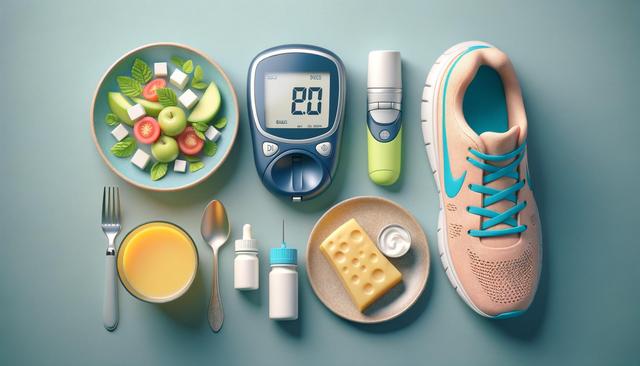Understanding Modern Approaches to Diabetes Treatment
Managing diabetes involves a combination of medical, nutritional, and lifestyle strategies aimed at controlling blood sugar levels and preventing complications.

Exploring Current Options in Diabetes Treatment
Diabetes treatment has evolved significantly over the years, especially for individuals managing type 2 diabetes. One of the most widely used medications is metformin, which helps control blood glucose levels. However, not all individuals respond well to it. As a result, there is growing interest in Metformin alternatives, which may include medications such as DPP-4 inhibitors, SGLT2 inhibitors, or GLP-1 receptor agonists. These alternatives offer different mechanisms of action and can be tailored to individual patient needs.
In addition to medications, lifestyle modifications remain a cornerstone of effective diabetes management. Regular physical activity, weight management, and a balanced diet all play a critical role in preventing blood sugar spikes and improving overall health. This comprehensive approach is particularly valuable for those seeking sustainable type 2 diabetes treatment strategies. It’s important to work with healthcare providers to develop a personalized plan that combines medication with lifestyle adjustments for optimal results.
The Role of Diet and Low Glycemic Index Foods
Nutrition is essential in any diabetes treatment plan. One of the most emphasized dietary strategies is the use of Low Glycemic Index Foods for Diabetics. These foods have a slower impact on blood sugar levels, which helps prevent sudden spikes and crashes. Examples include:
- Whole grains like oats and quinoa
- Legumes such as lentils and chickpeas
- Non-starchy vegetables like spinach, kale, and broccoli
- Fruits like berries and apples (in moderation)
Creating meals that incorporate these foods not only supports stable blood sugar but also contributes to heart health and weight control. For patients with a Heart Valve Failure Diagnosis, dietary management becomes even more crucial. These individuals often need to limit sodium and saturated fat intake, making low glycemic foods particularly beneficial.
Meal planning with a focus on portion control and nutrient-rich ingredients can make a significant difference in managing type 2 diabetes. When paired with consistent physical activity, a low glycemic diet can help improve insulin sensitivity and reduce the need for medications over time.
Advances in New Diabetes Medications
Pharmaceutical research continues to produce New Diabetes Medications that aim to offer better glucose control with fewer side effects. These innovations focus not only on reducing blood sugar but also on improving cardiovascular and kidney health. Some newer therapies include combination drugs that target multiple pathways, offering a more comprehensive form of type 2 diabetes treatment.
Patients with coexisting conditions such as hypertension or kidney disease may benefit from these newer options. They often provide additional protective benefits, which is an important consideration for individuals with complex health profiles. It’s essential to consult with healthcare professionals to determine whether these new treatments are appropriate based on individual medical history and current health status.
These medications often come with the advantage of once-weekly dosing or injectable forms that offer convenience for those who struggle with daily pill regimens. As always, medication should be just one part of a broader diabetes management plan that includes lifestyle changes and regular monitoring.
Exploring Natural Remedies for Diabetes
While conventional medicine remains the primary approach to managing diabetes, there is growing interest in Natural Remedies for Diabetes. These remedies often include herbal supplements, dietary changes, and traditional practices that aim to support blood sugar regulation naturally. Examples include:
- Cinnamon extract, which may help improve insulin sensitivity
- Fenugreek seeds, known for their potential to lower blood glucose
- Aloe vera, often studied for its hypoglycemic effects
- Bitter melon, a traditional remedy in some cultures
It’s important to note that natural remedies should not replace prescribed medications without medical supervision. However, when used responsibly and with professional guidance, they can complement traditional treatments to enhance overall well-being.
As individuals explore these options, they should remain cautious about the sources of information and ensure that any supplements are safe and vetted by health authorities. Integrative approaches that combine both conventional and natural strategies may offer a more holistic path to managing type 2 diabetes in the long term.
Is There a Cure for Diabetes?
The idea of a Cure for Diabetes is one that continues to attract attention from researchers and patients alike. While there is currently no definitive cure, ongoing studies are exploring ways to reverse or significantly reduce the impact of the disease. Approaches such as pancreatic islet cell transplantation, immunotherapy, and advanced gene editing techniques are being investigated as potential long-term solutions.
For type 2 diabetes, remission is possible in some individuals, particularly through intensive lifestyle changes or bariatric surgery. However, remission is not the same as a cure, as blood sugar levels may return to diabetic ranges over time if lifestyle interventions are not maintained.
Until a cure is confirmed and becomes widely available, the focus remains on effective type 2 diabetes treatments that manage symptoms and prevent complications. The key to success lies in early diagnosis, consistent management, and staying informed about new developments in the field.
Conclusion: Taking a Proactive Approach to Diabetes Care
Diabetes treatment encompasses a range of strategies, from medications and diet to natural remedies and emerging therapies. For those navigating type 2 diabetes, a tailored approach that includes Low Glycemic Index Foods for Diabetics, consideration of Metformin Alternatives, and awareness of New Diabetes Medications can significantly improve quality of life. While the search for a Cure for Diabetes continues, proactive management remains the most effective way to control the condition and prevent complications such as Heart Valve Failure Diagnosis. Staying informed and working closely with healthcare professionals empowers individuals to make the best decisions for their health journey.